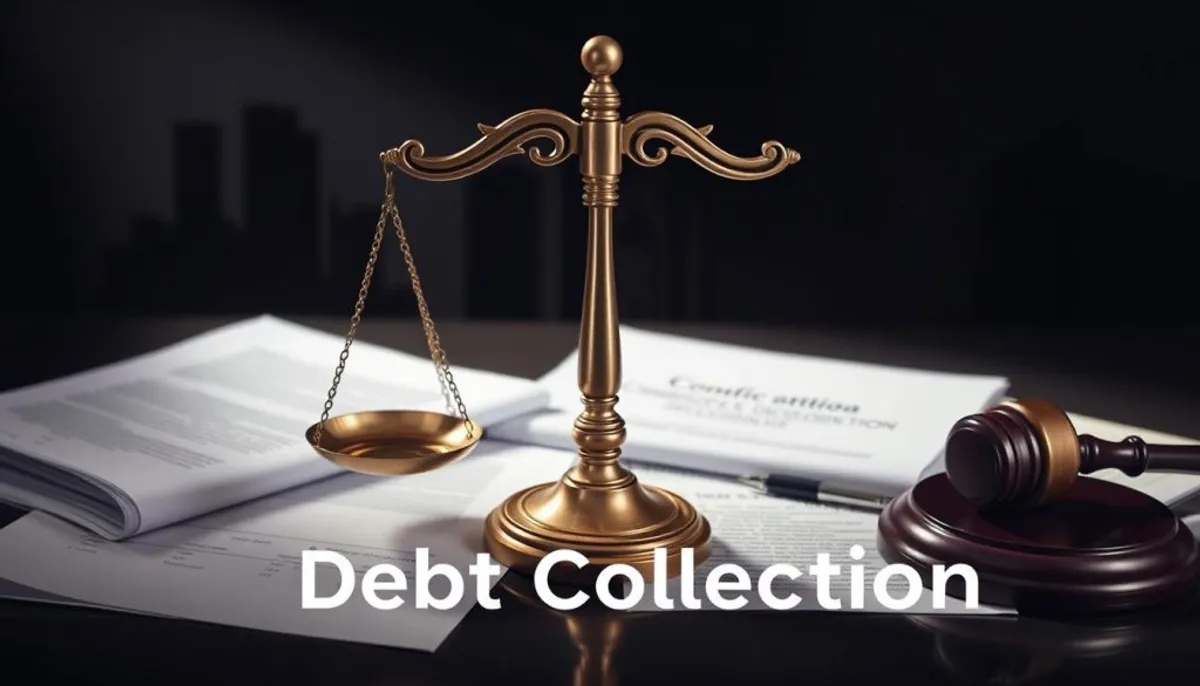Many businesses grapple with the issue of unpaid invoices. The challenge of overdue payments is widespread. Engaging a debt collection agency can significantly alter your accounts receivable management strategy. This guide will guide you through the process of identifying the ideal third-party debt recovery partner for your enterprise.
Choosing a professional debt collector transcends mere money recovery. It involves selecting a partner who grasps your industry’s nuances and can uphold your reputation while achieving success. We will explore legal aspects, credentials evaluation, and more to ensure you make a well-informed choice.

It’s crucial to recognize that not all debt collection agencies are alike. Some focus on specific debt types or industries. Others leverage advanced technology to streamline the collection process. By the conclusion of this guide, you will be equipped to identify the essential qualities of a debt collector and select one that aligns with your business’s unique requirements.
Key Takeaways
- Assess your specific debt collection requirements before starting your search
- Look for agencies with experience in your industry
- Check for proper licensing and certifications
- Understand different fee structures and pricing models
- Prioritize agencies with transparent communication and reporting
- Consider the agency’s use of technology in their collection process
- Ensure the agency complies with all relevant laws and regulations
Understanding the Role of Professional Debt Collectors
Professional debt collectors are pivotal in aiding businesses in retrieving outstanding debts. They employ specialized collection services to achieve delinquent account recovery across diverse debt types.
What Debt Collectors Do
Debt collectors are dedicated to retrieving funds owed to businesses. They employ skip tracing to track down debtors who have relocated without notice. These experts negotiate settlements, frequently recovering between 25% to 50% of the original debt amount.
Types of Debts Handled
Collection services encompass a broad spectrum of debts. Agencies specialize in recovering funds from both large corporations and small businesses, as well as individual consumers. Below is a detailed overview of common debt categories:
| Debt Type | Description |
|---|---|
| Credit Card | Unpaid credit card balances |
| Medical | Outstanding healthcare bills |
| Utility | Overdue electricity, water, or gas bills |
| Commercial | Business-to-business unpaid invoices |
Legal Framework and Compliance
Debt collectors must strictly adhere to legal frameworks. The Fair Debt Collection Practices Act governs their activities. It outlines rules on calling hours and prohibits harassment. Reputable agencies also carry Errors and Omissions Insurance for additional security. The statute of limitations for debt collection varies by state, generally spanning from three to five years.
Why Businesses Need Professional Collection Services
Businesses often struggle with unpaid invoices, a common challenge. Professional collection agencies offer a viable solution to reclaim lost income from bad debts. These experts, with their specialized skills, significantly enhance the chances of successfully collecting delinquent debts.
Commercial debt collectors provide customized programs suited to various business models. They offer flexible options, such as flat fee pursuit or commission-based collection. This flexibility empowers companies to select a strategy that best fits their financial objectives.
One significant benefit of professional collection services is the expedited payment process. Businesses see quicker recoveries compared to managing collections internally. This enhanced cash flow is essential for sustaining operations and driving growth.
| Aspect | In-House Collection | Professional Collection Agencies |
|---|---|---|
| Success Rate | Lower | Higher |
| Time to Collect | Longer | Shorter |
| Legal Expertise | Limited | Comprehensive |
| Resource Allocation | Diverts from core business | Allows focus on core activities |
Professional collection agencies also ensure detailed documentation of all debtor communications. These records are crucial for legal actions or tax purposes. By engaging commercial debt collectors, businesses can safeguard their interests while preserving key client relationships.
Essential Qualifications to Look for in Debt Collectors
In the quest to hire debt recovery specialists, it is imperative to seek candidates with a blend of skills and qualifications. The ideal candidate should possess legal acumen, financial literacy, and technological proficiency. These attributes are crucial for excelling in the demanding field of debt collection.
Required Licenses and Certifications
Debt collectors must hold the necessary licenses, bonds, and adhere to relevant regulations. It is the responsibility of collection law firms to ensure their staff is certified. This ensures legal and ethical operation within the industry.
Industry Experience and Specialization
Seek candidates with a robust background in debt management and financial counseling. Experience in specific sectors, such as healthcare or commercial collections, is highly beneficial. Effective communication skills are paramount for negotiating payment plans and resolving conflicts diplomatically.
Technical Skills and Software Proficiency
Modern debt collection heavily relies on technology. It is essential to find collectors proficient in industry-specific software, including FICO, Collect!, and PaymentVision. Strong organizational skills are also critical for efficiently managing large volumes of accounts.
| Key Skills | Importance |
|---|---|
| Communication | High |
| Problem-solving | Critical |
| Attention to detail | Essential |
| Professionalism | Crucial |
By prioritizing these qualifications, businesses can assemble a team of adept debt recovery specialists. Such a team is capable of achieving high success rates while upholding compliance and professionalism.
How to Hire Debt Collector: Step-by-Step Process
Engaging a debt collector is a pivotal step for enterprises aiming to reclaim unpaid debts. This process necessitates meticulous evaluation and research to select an optimal third-party debt recovery entity. We will dissect the pivotal steps involved in effectively hiring a debt collector.
Initial Assessment and Research
Begin by assessing your specific debt collection requirements. Consider the debt amount, its age, and your relationship with customers. Investigate potential agencies, emphasizing their reputation, credentials, and success rates. Agencies with Better Business Bureau accreditation are generally more trustworthy.
Screening Potential Candidates
Compile a list of agencies that meet your criteria. Examine their services, fees, and collection strategies. Solicit proposals and quotes from each contender. Favor agencies offering a “No Recovery, No Fee” policy, a common practice among reputable collectors.

Conducting Interviews
Arrange interviews with your leading contenders. Inquire about their understanding of debt collection laws, software utilization, and strategies for challenging cases. Discuss their communication and reporting protocols. Agencies with dedicated account managers are preferred by 72% of businesses for their personalized service.
It’s noteworthy that 67% of customers with overdue accounts settle their debts promptly upon agency intervention. Adhering to these guidelines will empower you to select an adept debt collector for your enterprise’s needs.
Understanding Collection Agency Fee Structures
Understanding the fee structures of debt collection agencies is essential for businesses. It aids in selecting the most suitable accounts receivable management solution. We will examine the prevalent pricing models in the industry.
Contingency Fees
Contingency fees are the dominant pricing model in debt collection. Agencies charge a percentage of the recovered amount, typically between 15% and 50%. The specific rate often hinges on the debt’s age and complexity. For example, newer debts might incur fees of 15-20%, whereas older or legally complex cases could reach 35-50%.
Flat-Rate Services
Some debt collection agencies provide flat-rate services. These fees range from $10 to $50 per account, irrespective of the amount collected. This model offers cost predictability but may not always match the recovery amount.
Debt Purchasing Options
In certain instances, a debt collection agency might propose to purchase the debt outright. This option provides immediate cash flow but at a significantly reduced amount compared to the original debt. It is commonly employed for older debts that are challenging to collect.
| Fee Structure | Typical Range | Best For |
|---|---|---|
| Contingency Fees | 15-50% of collected amount | Businesses with variable debt amounts |
| Flat-Rate Services | $10-$50 per account | Companies with consistent debt values |
| Debt Purchasing | Varies based on debt age and type | Businesses needing immediate cash flow |
Grasping these fee structures is crucial for effective accounts receivable management. Select a model that resonates with your business needs and financial standing for the best outcomes.
Evaluating Agency Communication and Reporting
Engaging with professional collection agencies necessitates clear communication and transparent reporting. Businesses must establish clear expectations regarding contact frequency and methods. It is imperative to receive regular updates on collection activities, progress, and outcomes. This ensures the effectiveness of the services provided.
Modern collection agencies often employ real-time dashboards or client portals. These tools grant immediate access to critical information, fostering transparency and facilitating swift decision-making. For entities frequently sending accounts to collections, receiving regular acknowledgment reports is crucial.
Monitoring specific performance indicators is essential. These include:
- Days Sales Outstanding (DSO)
- Cost of Collections
- Collections Effectiveness Index (CEI)
Some agencies, such as BYL, utilize Tableau software for customizable reporting. This adaptability enables businesses to create reports that align with their unique requirements. Additional valuable reports might encompass call logs, collection notes, and demographic data.
It’s noteworthy that agency methodologies can differ significantly. While 28% of agencies adhere to rigid approaches, 15% offer flexible strategies tailored to client preferences. For smaller claims, a standardized method proves effective 45% of the time. Yet, 80% of larger claims necessitate a customized approach.
By emphasizing effective communication and detailed reporting, businesses can optimize the benefits of their collection services. This approach enables them to make informed decisions regarding their accounts receivable management.
ti3: A Modern Alternative to Traditional Debt Collection
In today’s business landscape, managing accounts receivable is paramount. With 89% of small-to-medium-sized businesses facing late payments as a major hurdle, a modern solution is imperative. ti3 emerges as a pioneering platform, transforming the way delinquent accounts are recovered.
Automated Payment Reminders
ti3 harnesses advanced technology for timely reminders. This is crucial, given that 30% of outstanding invoices need three or more reminders for resolution. By automating this function, businesses conserve time and enhance their likelihood of receiving payments promptly.
Streamlined Collection Process
The platform introduces a streamlined debt collection methodology. Given that 40% of businesses lack a structured debt recovery process, ti3 addresses this critical need. It oversees the entire collection cycle, from initial reminders to escalation, ensuring a consistent and effective strategy.
Client Relationship Management
ti3 ensures the preservation of positive client relationships while pursuing payments. This balance is essential, as 79% of small business owners reduce their own compensation due to late payments. The platform’s approach facilitates the recovery of funds without jeopardizing valuable customer relationships.
| Feature | Benefit |
|---|---|
| Automated Reminders | Reduces manual work, increases payment likelihood |
| Streamlined Process | Improves efficiency in accounts receivable management |
| Relationship Management | Maintains customer goodwill during delinquent account recovery |
By adopting ti3, businesses can markedly enhance their accounts receivable management and delinquent account recovery. This addresses the 65% of businesses dedicating 14 hours weekly to payment collection tasks.
Legal Compliance and Risk Management
Collection law firms and debt recovery specialists operate under strict regulations. Legal compliance is essential to avoid costly penalties and maintain a good reputation. This section explores key aspects of legal compliance and risk management in debt collection.
FDCPA Regulations
The Fair Debt Collection Practices Act (FDCPA) establishes rules for debt collectors. It prohibits unfair practices and protects consumers. Debt recovery specialists must adhere to these guidelines to avoid legal issues. For instance, they cannot call debtors at odd hours or use threatening language.
State-Specific Requirements
Each state has its own set of rules for debt collection. Collection law firms must be aware of these laws. They may require special licenses to operate in certain states. Keeping abreast of state laws is crucial to avoid legal trouble.
Insurance and Bonding
Debt collectors should have insurance and bonding. This protects them and their clients from financial losses. If a collector makes a mistake, insurance can cover the costs. Bonding demonstrates that a collector is trustworthy and follows the rules.

Risk management is vital for collection agencies. They face numerous risks, including:
- Compliance risks from breaking consumer protection laws
- Data security risks if sensitive information is leaked
- Reputation risks that can harm their business relationships
- Financial risks from poor debt recovery rates
To manage these risks, debt recovery specialists employ various strategies. They conduct regular compliance audits, implement strong data security measures, and carefully vet new clients. By focusing on legal compliance and risk management, collection law firms can operate more effectively and protect their businesses.
Assessing Collection Success Rates and Performance
When engaging commercial debt collectors or third-party debt recovery services, evaluating their success rates and performance is paramount. This evaluation ensures businesses collaborate with agencies that are not only effective but also deliver tangible results.
Key performance indicators (KPIs) are essential in gauging collection efficiency. The Days Sales Outstanding (DSO) metric reveals the average time customers take to settle their debts post-purchase. A lower DSO signifies superior collection success. The Collector Effective Index (CEI) quantifies an entity’s proficiency in collecting receivables, with a score of 100% indicating complete collectibility.
Additional metrics of significance include:
- Right Party Contacts (RPC) rate: measures success in contacting the correct individual
- Percentage of calls resulting in Promise to Pay (PTP)
- Profit per Account (PPA): assesses the average profit derived from each account
Comparing current month data against previous months and the same month in prior years offers profound insights into collection performance. Tracking year-to-date comparisons and evaluating the proportion of current versus past-due accounts receivable aids in assessing the credit department’s efficacy.
Regular performance reviews and the analysis of collection reports are crucial to ensure chosen agencies meet expectations. By monitoring these metrics, businesses can refine their debt recovery strategies, thus enhancing their overall financial well-being.
Industry-Specific Collection Strategies
Debt collection agencies employ tailored strategies for various sectors, acknowledging the distinct challenges each industry presents. This adaptation ensures effective collection services across different fields.
Healthcare Collections
In the healthcare sector, collectors face intricate billing systems and insurance claims. They must adhere to HIPAA to safeguard patient privacy. Given the escalating medical costs, agencies often assist in establishing realistic payment plans for patients.
Commercial Collections
Business-to-business debt recovery necessitates a distinct approach. Agencies handling commercial debts manage substantial sums and intricate financial agreements. Their primary goal is to maintain business relationships while ensuring payment.
Consumer Debt Collections
Consumer debt collection balances firmness with legal adherence. Agencies must comply with the Fair Debt Collection Practices Act while pursuing payment. They employ diverse communication strategies to engage consumers and facilitate settlements.
| Industry | Key Challenges | Collection Strategies |
|---|---|---|
| Healthcare | High costs, insurance complexities | HIPAA compliance, flexible payment plans |
| Commercial | Large debts, contract disputes | Negotiation, preserving business ties |
| Consumer | Varying debt sizes, legal restrictions | Multiple contact methods, settlement offers |
Opting for a debt collection agency with sector-specific knowledge can markedly enhance recovery success. Such specialized agencies grasp the subtleties of each industry, leading to more effective and compliant collection efforts.
Technology and Tools in Modern Debt Collection
The debt collection industry has undergone a significant transformation with the integration of advanced technology. Modern tools are revolutionizing accounts receivable management and delinquent account recovery processes.
Debt collection agencies now employ sophisticated software for communication, scheduling, and automated reminders. These systems streamline operations and boost efficiency. Auto-dialers enable collectors to reach debtors quickly, while integrated payment options simplify transactions.
Predictive analysis plays a crucial role in modern debt collection. Agencies use advanced models to identify high-risk debtors and forecast default probabilities. This data-driven approach optimizes communication strategies and enhances recovery rates.
Mobile technology has also reshaped the industry. Collectors can now work remotely, maintaining productivity on-the-go. Smartphone payment apps facilitate faster, more secure transactions, improving the overall debt recovery process.
| Technology | Impact on Debt Collection |
|---|---|
| Process Automation | Increased efficiency, time and cost savings |
| Mobile Technology | Improved communication, flexible work options |
| Predictive Analysis | Better risk assessment, optimized strategies |
| AI-driven Analytics | Accurate defaulter prediction, increased recovery rates |
The integration of these technologies has significantly eased the accounts receivable management process. By leveraging data and analytics, debt collection agencies can refine their strategies, leading to improved financial returns and more effective delinquent account recovery.
Conclusion
Acquiring the skill to hire a debt collector is vital for businesses seeking to efficiently recover outstanding debts. This endeavor requires a thorough examination of several critical aspects. These include legal adherence, industry acumen, and the agency’s reputation. It is imperative to scrutinize their fee structures, technological prowess, and historical performance.
Debt collection agencies bring numerous benefits to the table. They significantly enhance cash flow and streamline the payment process. They also act as a neutral intermediary, helping to maintain cordial client relationships. Leveraging advanced technology and sophisticated skip-tracing methods, these professionals significantly boost debt recovery rates. This not only saves businesses time but also conserves valuable resources.
Whether selecting a conventional agency or embracing innovative solutions like ti3, the overarching objective remains consistent. It is to bolster cash flow while safeguarding professional rapport. By entrusting debt collection to a reputable agency, businesses can concentrate on their core activities. They can rest assured that their outstanding debts are being professionally managed.
RelatedRelated articles



